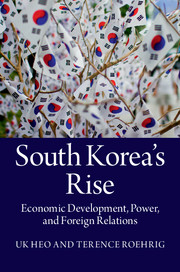Book contents
- Frontmatter
- Dedication
- Contents
- List of figures
- List of tables
- Acknowledgements
- 1 Introduction
- 2 Economic development, state power, and foreign policy
- 3 Inter-Korean relations: confrontation, economic exchanges, and the nuclear crisis
- 4 South Korea and the United States: from dependency to partnership
- 5 South Korea, Russia, and China: from adversaries to economic partners
- 6 South Korea and Japan: an ambivalent relationship
- 7 South Korea and the European Union: evolving cooperation and competition
- 8 South Korea and India: opportunities and obstacles
- 9 South Korea and the developing world: Africa, Latin America, the Middle East, and Southeast Asia
- 10 Contributing to the international community: from consumer to producer
- 11 Conclusion
- Bibliography
- Index
- References
7 - South Korea and the European Union: evolving cooperation and competition
Published online by Cambridge University Press: 05 July 2014
- Frontmatter
- Dedication
- Contents
- List of figures
- List of tables
- Acknowledgements
- 1 Introduction
- 2 Economic development, state power, and foreign policy
- 3 Inter-Korean relations: confrontation, economic exchanges, and the nuclear crisis
- 4 South Korea and the United States: from dependency to partnership
- 5 South Korea, Russia, and China: from adversaries to economic partners
- 6 South Korea and Japan: an ambivalent relationship
- 7 South Korea and the European Union: evolving cooperation and competition
- 8 South Korea and India: opportunities and obstacles
- 9 South Korea and the developing world: Africa, Latin America, the Middle East, and Southeast Asia
- 10 Contributing to the international community: from consumer to producer
- 11 Conclusion
- Bibliography
- Index
- References
Summary
The relationship between South Korea and Europe had been limited until the 1990s. To Europeans, South Korea was merely a poor country in East Asia. With scarce natural resources and underdeveloped industries, South Korea did not have much to offer and European countries did not see the need to expand their relations with South Korea. As a result, in the 1960s South Korea’s trade with Europe was only about 5 percent of its total trade volume and political contact between them was minimal.
However, economic development in South Korea along with fast growth of the other Asian tigers, Taiwan, Hong Kong, and Singapore, changed Europe’s view of East Asia. As South Korea became an economic powerhouse in Asia, economic exchanges between South Korea and Europe gradually increased. Political contact between South Korea and Europe also began to increase in the 1980s. For example, in 1983, a ministerial meeting between South Korea’s Foreign Minister and the European Community (EC) Executive Committee was held for the first time. Since then, the two sides have met annually ever since the European Union (EU) was created.
- Type
- Chapter
- Information
- South Korea's RiseEconomic Development, Power, and Foreign Relations, pp. 110 - 127Publisher: Cambridge University PressPrint publication year: 2014



